144 Search Results for isaac
October 26, 2015
by Carole Zangari -
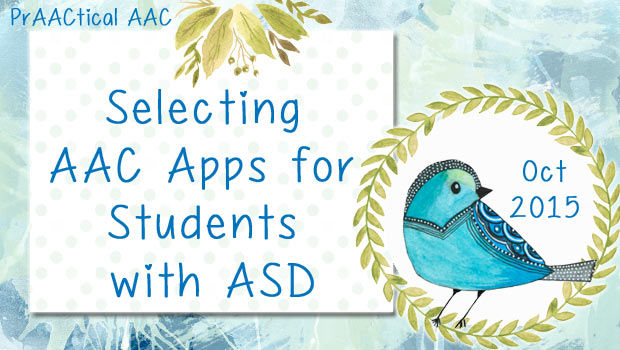
“What’s the best AAC app?” I’m starting to think that every AAC SLP has been asked this question at least a dozen times. And with over 200 AAC apps for mobile devices to choose from, it’s no wonder that families and professionals are looking for guidance. So when USSAAC (the US Society for AAC) invited me to participate in their webinar series, I knew just which topic I wanted to tackle. In today’s post, you can see the archived version of that webinar, get the handout, and pose some questions using the ‘Comments’ feature at the bottom of the page. Before we get to that, though, I’d like to encourage those of you with strong interests in AAC who live in the US to become members. USSAAC is our national chapter of the International Society for AAC (ISAAC), and if you are not already familiar with the organization, please consider checking... [Read More...]
April 15, 2015
by Carole Zangari -

It’s so important for those of us who teach AAC to hear directly from the people who use those tools and strategies on a daily basis. In this week’s video, Vic Valentic, who served as the ISAAC Leadership Chair for People Who Use AAC, shares a bit about the role of AAC in his life at home, school, and work. You can see some more of Vic’s work here.
January 8, 2015
by Carole Zangari -
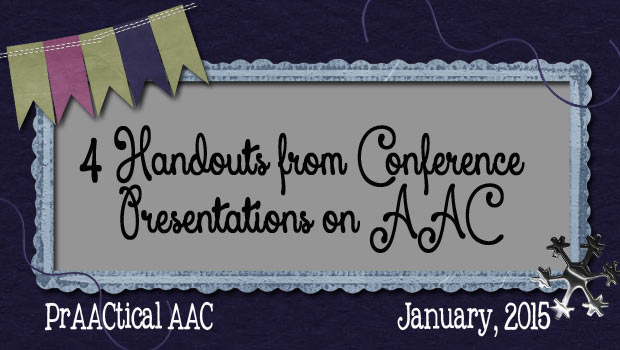
Travel budgets are limited these days and we can’t always get to the conferences we’d love to attend. In case that happens to you, too, here are some presentation handouts on AAC-related topics from ISAAC 2014, ASHA 2014 and other conferences. Gloria Soto, Dan Phillips, and Michaela Sullivan on Strategies for SLPs Working With Students With AAC Needs in Schools Gretchen Hanser on Writing for Students with Angelman Syndrome Penny Hatch and Allison Dennis on Getting to the Core: Creating a Core Vocabulary for the Common Core Amy Wetherby on the trajectory of development for toddlers with developmental disabilities
September 5, 2014
by Carole Zangari -
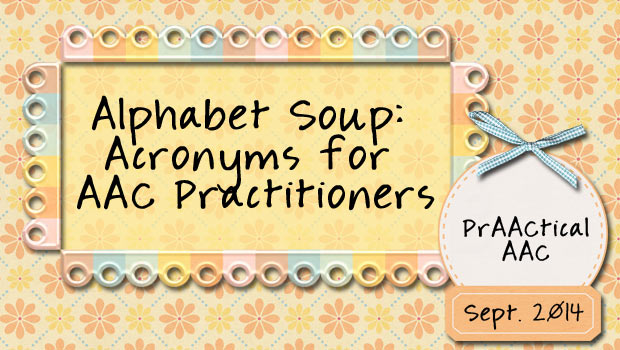
We’re excited about the passion and enthusiasm for AAC shown by many new SLPs and graduate student clinicians. One of the things they sometimes struggle with in reading and writing reports is the number of acronyms that we tend to use. This is always a problem in clinical and scholarly writing, but when the field is incredibly diverse and transdisciplinary, the challenges multiply. Here’s a starter list of acronyms* and their meanings. Many, MANY thanks to those who helped us create this list on the PrAACtical AAC Facebook page. AAC-RERC – AAC Rehabilitation Engineering Research Center ACOLUG – Augmentative Communication Online Users’ Group AiLS, ALgS, and ALs – Aided language stimulation ALI – Aided language input ALS – Amyotrophic lateral sclerosis AOTA – American Occupational Therapy Association APTA – American Physical Therapy Association ASD – Autism spectrum disorder ASHA – American Speech Language Hearing Association AT – Assistive technology ATIA... [Read More...]
August 9, 2014
by Carole Zangari -
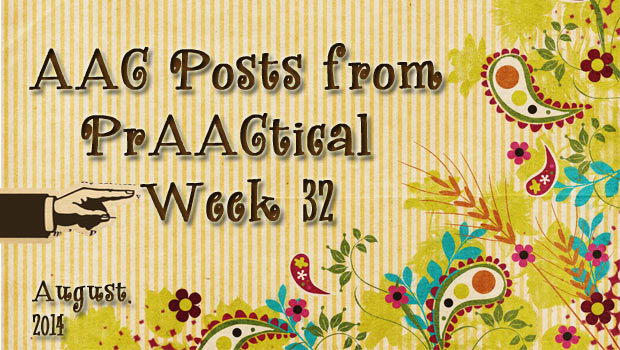
Sunday – Video of the Week: Augmented Input with Dr. Jill Senner Monday – Communication Opportunities Tuesday – 5 AAC Handouts from ISAAC 2014 Wednesday – Watch It Wednesday: Eye Gaze Research Thursday – Learn by Listening with Chris Bugaj Friday – A PrAACtical Tool for Emergencies and Accidents
July 31, 2014
by Carole Zangari -
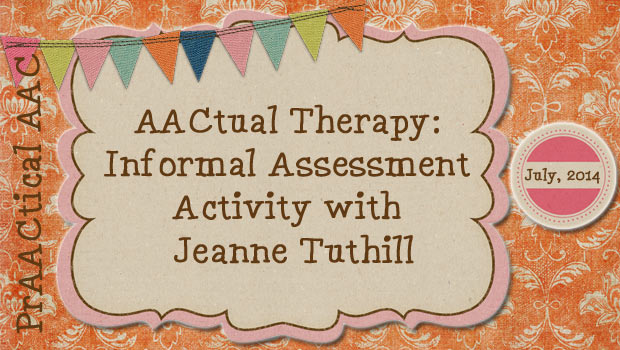
We are so pleased to have a return visit by SLP Jeanne Tuthill. In this post, she shares an informal assessment activity based around a Book of Favorites. Enjoy! ::::::::::::::::::::::::::::::::::::::::::::::::::::::::::::::::::::::::: Greetings from Massachusetts! My work at the Collaborative for Educational Services is on a school-year contract so I’m currently on summer break with my three girls. We’ve been plenty busy with fun summer activities but my learning and growing as an AAC therapist isn’t tied to my contract dates. I’ve also been busy watching webinars, reading some great books (educational as well as pleasure-reading), and following the Facebook feeds of some of my favorite AAC peeps! I really wish I could have attended ISAAC in Lisbon, Portugal this year…I loved seeing everyone’s photos and posts from what looked to be a spectacular conference! In my last post on assessment I shared with you an ice-breaker activity that is low-stress for... [Read More...]
July 26, 2014
by Carole Zangari -
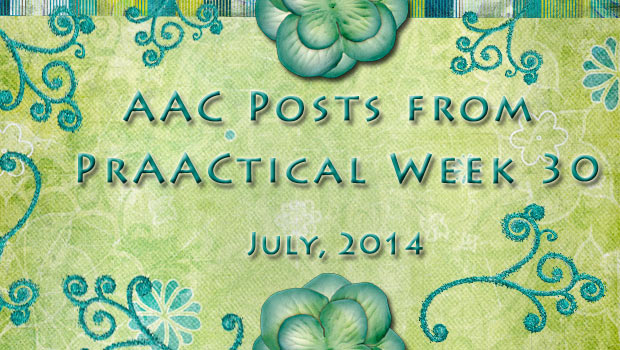
Sunday: Video of the Week: If You Listen, You Will Hear Us Monday: Social Media and People with Disabilities Tuesday: Welcome to ISAAC 2014: The World’s AAC Conference Wednesday: ISAAC 2014: Discovering Communication Thursday: Wrapping Up at ISAAC 2014 Friday: PrAACtical Tip: Tracking Apps We Use in Therapy
July 21, 2014
by Carole Zangari -
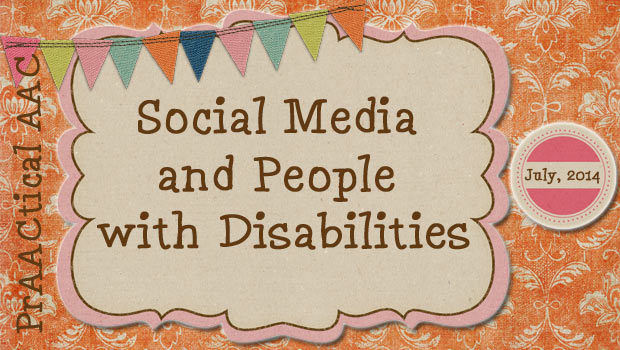
If you’re an AAC lover there’s no better place to be this week than the 16th the Biennial Conference of the International Society for AAC (ISAAC) at the Lisboa Congress Centre. Every two years, AAC stakeholders from around the world gather to consider the latest research, learn from one another, discuss issues of controversy, see new products. connect and renew relationships, and have a great time. From the pre-conference workshops, to the AAC Camp, to the main conference, to the Exhibit Hall, to the Research Symposium, this is the place to be to get AAC inspiration. There won’t be much time for writing but we’ll try to keep you posted with photos from the conference. You can also follow along on Twitter with the conference hashtag, #ISAAC2014 To start get in the ISAAC mood, check out this presentation by Lisa Lehman, the 2012 Outstanding Consumer Lecturer.
July 13, 2014
by Carole Zangari -
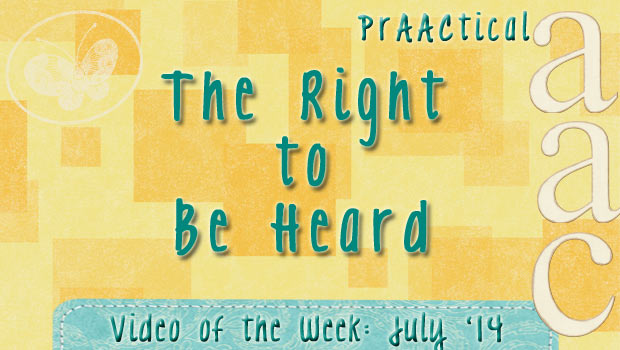
“People with disabilities are exposed to abuse at least four times more than the general population.” For this week’s featured video, we travel to Israel to learn about an initiative with the justice system that promotes the right of individuals with AAC needs to communicate in legal contexts. Kudos to ISAAC Israel and the many other organizations and individuals for their work on this important topic. Direct Link to Video: https://www.youtube.com/watch?v=Bgmli_aElYY&index=149&list=PLSDejtWRUZQqCqWogs1ME9Z1dXfxwvrrY
June 10, 2014
by Carole Zangari -

Picture exchange is powerful strategy for building symbolic communication in individuals with significant communication difficulties. We’ve posted about implementation of PECS a few times, and included references to research supporting its efficacy in some additional posts. Today, we look at a sequence of three single subject design experimental studies by Dr. Jeff Sigafoos and other researchers that looked at how the use of picture exchange and AAC devices (SGD condition) impacted social interaction. In the initial study, the team taught requesting skills either with picture exchange or AAC devices and then looked to see if there were any changes in social interaction. They hypothesized that the physical act of picking up a symbol and giving it to someone, as with the picture exchange condition, would make the learner less likely to turn away from his communication partner. So, in addition to measuring how well the participant learned to make requests,... [Read More...]









